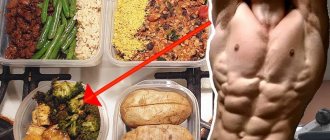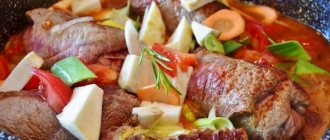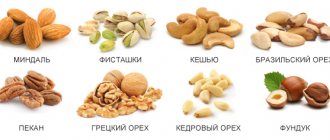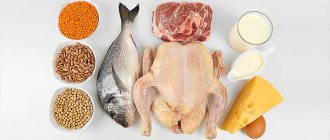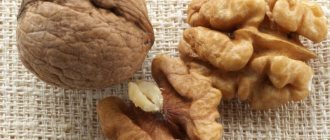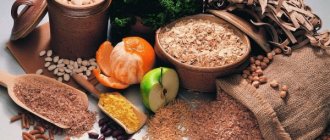Fitness myths: carbohydrates turn into fat in the evening
Not eating carbohydrates in the evening (or not eating at all in the evening), because everything eaten will not have time to be spent on energy and will go into fat - this is still one of the most popular weight loss myths.
A plate of pasta for dinner causes sacred horror in any girl who is losing weight, and for some it is a completely harmless fruit. People remember the saying about dinner, which must be given to the enemy, and believe: the closer it is to bedtime, the less you need to eat, especially carbohydrates. After all, at night your metabolism slows down, and everything you eat simply won’t have time to be spent – that’s what they say on the Internet.
Metabolism at night
At night you sleep, don't think and don't move. Obviously, you burn fewer calories than during the day, even if you're just sitting on the couch. There seems to be some logic to this.
On the one hand, metabolism in the first half of the night (the first half of your sleep) actually decreases by 35% (1). But in the second half it grows noticeably. Because of these metabolic ups and downs, average energy expenditure during sleep is not much different than during daytime rest (2). Additionally, exercise increases your metabolic rate during sleep, which leads to more fat oxidation (3).
To be fair, obese people still have a lower metabolism during sleep than during daytime rest. But unless you're obese, not only will your metabolism not slow down while you sleep, but it may even increase periodically (4).
Insulin
The second complaint about evening meals is a decrease in insulin sensitivity, when glucose goes into fat instead of muscles. Compared to a morning meal, blood glucose levels remain elevated longer after an evening meal (5, 6).
But comparing any meal with the morning one is not entirely correct, because in the morning insulin sensitivity is much higher due to overnight fasting. And if you compare the level of glucose and insulin after an evening meal and any daytime meal, then there is practically no difference.
What Science Says
We can talk at length about various complex things like insulin sensitivity and nighttime metabolic rate. Fortunately, a recent study conducted at the Hebrew University of Jerusalem and published in the journal Obesity examined the issue of evening carbohydrates.
The participants were divided into two groups - control and experimental. Both groups were put on the same calorie deficit for six months with the same amounts of protein, carbohydrates and fat. One group ate carbohydrates throughout the day, and the second group ate 80% of all carbohydrates at dinner. The results showed greater weight loss, abdominal circumference and reduction in body fat mass, greater satiety and less hunger in the second group.
Of course, even though this group lost more fat and had better markers of health at the end of the study (better insulin sensitivity, increased good cholesterol, and decreased bad cholesterol), it is too early to say that this is exactly what you need to eat to lose weight quickly. . More research is needed. But one thing we can take away from it for sure: carbs for dinner by themselves do not make a person fatter.
What is the problem?
A no-carb diet after X number of hours sounds good in theory, but rarely works in the real world.
Disruptions
If you move most of your food to the first half of the day, it will be difficult to fight evening hunger. And it will definitely come, because it is impossible to eat enough once and for the whole day, no matter how much you eat.
Social isolation
Eating in the evening is part of the culture of our society. And living in a world where you can't go out to dinner with friends or at home with your family is hard. This is one of the reasons why so many people hate diets.
Unnecessary complication
Consistency and patience are probably the two most important aspects of dieting that few people discuss. Instead, we're concerned with carb timing, macronutrient ratios on the plate, glycemic index, insulin index, and other things.
Rules help organize proper nutrition, but unnecessary restrictions make the diet incompatible with life. With more freedom to choose how and when you eat, you're more likely to stay on track for as long as possible.
The “no food after X hours” diet may not suit everyone, because everyone has their own lifestyle, daily routine and activity level. Choosing the frequency of meals and the distribution of foods throughout the day should be realistic and convenient for you.
Look for things that don't make you isolated and unhappy. And for most people, this will include a filling dinner.
Workouts and carbs in the evening
A separate question: should you eat after training if you want to lose weight? Or should you go to bed hungry so that your body burns more fat?
Here you can read in detail about the importance of nutrition around training.
Carbohydrates are energy. If you train in the evenings, then shifting carbohydrates to the evening makes direct sense: by consuming them before training, you provide yourself with energy for high-quality work. By consuming them after training, you speed up the body's recovery.
Insulin sensitivity is high after exercise (7, 8), so there's no need to worry about everything you eat turning into fat. Moreover, on a calorie deficit.
Psychology
Lyle MacDonald, in her articles on women's training, writes that for some women, shifting most of their calories to the evening may be more effective for losing weight.
Firstly, it's a full dinner with your family or in a restaurant instead of lettuce on your plate.
Secondly, many people work during the day and forget or do not have time to eat properly. It's also easier for them to take their mind off food while they're doing something. This is where mindful meal planning with shifting calories for dinner can help. In the evening, when all the work is over and a person is left to his own devices, it is very difficult to refuse food - the refrigerator beckons, it sucks in the pit of your stomach, and nothing distracts you from thoughts of hunger.
Thirdly, a sufficient amount of carbohydrates in the last meal helps you fall asleep faster (and there are often problems with falling asleep on a diet due to feelings of hunger).
conclusions
We can argue about the best dietary approaches, but calories will always be at the core of weight loss. This does not mean that the composition of food is not important, but it does mean that calories are still more important.
There is no point in being afraid that eating at a calorie deficit will be stored as fat. After each meal, the anabolic phase begins when the food begins to be absorbed. Nothing you eat stays in your bloodstream, whether you eat during the day or in the evening.
And then everything is determined by whether you have a calorie deficit during the day or not. If there is, then what is deposited will be extracted and used for energy. If not, then you will have to keep it in reserve and replenish it if you like to eat at night and don’t watch your diet.
Eating in the evening does not make a person fatter. What makes it fatter is too much food (calories) all day long. Being overweight depends on how much you eat, not when.
fitlabs.ru
How to replace high carb foods with low carb foods
Low-carb diets can be effective, but for many people, switching to low-carb diets is too difficult. Many tried it and began to hate it, or simply did not know what to do. Don't worry, I'll help!
This approach seems simple until you realize how many of your favorite foods are high-carb. Bread, rice, pasta, potatoes are the cornerstone of most diets.
Yes, you CAN refuse such foods, but then the contents of your plate will not look appetizing. Can you imagine chili sauce without rice, or pasta bolognese without spaghetti? What about steak without potatoes? Personally, I don’t!
Like you, I don’t want to give up my favorite foods. So I did my research and found some GREAT low carb options that would be good alternatives to junk foods.
Each of them is tested and approved by me personally! I love this food, you can be sure that it retains not only the carbs, but the flavor as well.
Try these options. I am confident that once you do this, you will never give up carbs again!
https://youtu.be/OHHKefEfkTk
Answers to the most frequently asked questions about carbohydrates | Body transformation
Carbohydrates are even more controversial in the fitness community than fats. They are an integral part of the diet and the main source of energy. 1 g of carbohydrates, like 1 g of proteins, contains 4 kcal, but the thermal effect is much lower - within 5-15% of the kcal is spent by the body on their processing. Carbohydrates vary in quality. By choosing the right sources, consuming them in the right quantities and at the right times, you can influence how you feel and how quickly you achieve your desired shape. And now answers to the most frequently asked questions about carbohydrates in nutrition.
What types of carbohydrates are there?
Simple (sweets, flour products, fruits, berries, in general, everything that contains sugar in one form or another). They are quickly absorbed, provide short-term energy, and the feeling of fullness does not last long.
Complex (anything that has a complex chain of sugars, but without a noticeable sweet taste, like whole grains, potatoes, oats, rice). They are absorbed for a long time and allow you to maintain a feeling of satiety for a long time. Fiber (this is dietary fiber, which contains whole grains, leafy vegetables and more, the peel of various vegetables and fruits). Gives a feeling of fullness, since fiber slows down the absorption of nutrients, has few calories, low GI.
Which carbohydrates should I eat and which should I not?
Depends on the goal. One way to assess how a carbohydrate will affect your body is the glycemic index, or GI. author Ekaterina Golovina Low GI foods will help people with poor sensitivity to carbohydrates and insulin to maintain stable sugar levels, prevent overproduction of stored insulin, which leads to a decrease in sugar levels, and as a result, physical and mental fatigue.
Why is it recommended to eat mostly complex carbohydrates on a diet?
Because whole grains and vegetables contain fiber, which slows down the rate of absorption, gives a feeling of fullness, evens out sugar levels, and removes waste products from the body. Whole foods, like vegetables and grains, also contain important micronutrients and vitamins.
What about fruits, are they ok on a diet?
One of the most frequently asked questions among those losing weight is about carbohydrates. Hmm, why not? Moderation is important, since fruits contain fructose and glucose, which are simple carbohydrates, but in addition to them, fruits contain vitamins, minerals, and fiber.
Can I use fructose instead of sugar?
No. Although it has a low GI, eating processed fructose can increase the rate of fat production in the liver. It is better to avoid processed fructose and products that contain it.
What about honey?
Honey is a simple carbohydrate consisting of half glucose and half fructose. It has almost the same calories as sugar. Moreover, from a nutritional point of view, all sugars are the same for the body. If you want honey, then there is a time and place for everything.
How many carbohydrates should you eat?
Depends on your goal and activity, but not less than 100 g/day, since this is necessary for normal brain function. You can calculate your carbohydrate intake using the articles: a guide to creating an individual diet and how to balance your diet.
Do carbohydrates make you fat?
But what about both from proteins and from fats? They get fat from excess calories, and with carbohydrates it’s easy to get this excess, especially if you eat sweets, flour products, sugar, etc. By the way, glucose is used not only for energy, but also to create glucosamine, a component of connective tissue, but there is a clear limit. The brain also feeds on glucose.
Is it true that to lose weight you need to reduce the amount of carbohydrates?
You need to cut down on calories. The proportion of carbohydrates in the diet will depend on the amount of excess fat, body characteristics, activity level, and health status. It is optimal when 50% of calories come from carbohydrates. The lowest carbohydrate level is considered to be 100 grams of carbohydrates. There are diets where carbohydrates are reduced to 50 g/day. (LCHF) and lower (ketogenic diet), but a different mechanism operates there.
When do you need a cheat meal?
Once a week or two (depending on the % of fat) during a calorie deficit. You can read how, when and what to do a cheat meal here. When limiting carbohydrates, it is wise to do not a cheat meal, but a carbohydrate refeed. With an adequate calorie deficit, you can safely do without a cheat meal, carefully incorporating your favorite foods into your diet.
Is it possible to eat carbohydrates at night?
Certainly. It's normal to shift carbohydrate calories from breakfast into the evening. You can include them in your dinner if you lift heavy weights regularly, are active during the day and fit perfectly into your KBJU standards. It doesn't matter what time you eat carbs on your diet. It is important that you stay in a calorie deficit.
Why then do they say that carbohydrates are not allowed in the evening?
It depends on who. For example, if you are losing weight, you eat most of your carbohydrate calories during the active half of the day and in the evening you no longer fit into your norms. You can do without them if you have a high percentage of body fat. They are not needed in the absence of serious strength training and lack of basic activity. Evening carbohydrates will be unnecessary if you have poor insulin sensitivity.
Why are fruits and potatoes not allowed on the diet?
Fruits and potatoes are limited on low-carb diets. Peeled boiled potatoes are a carbohydrate product; fruits contain sugar and are classified as simple carbohydrates. On low-carb diets, in order to fit into your BJU norm, you have to choose from less calorie and more fiber foods. But you don't have to cut carbs too much to lose weight. Eat a balanced diet, eat fruits and potatoes in moderation. There are no bad or good foods, so you don't have to paint everything black and white.
I'm on a low-carb diet, but the weight isn't coming off?
Do you think that if you eat few carbs and keep your sugar (and insulin) levels normal, you will lose weight? No, you won't if you're eating in a calorie surplus. There are many low-carb, but high-calorie foods that are very easy to overeat - cheese, peanuts, nuts, cream. 100 g of nuts contain approximately 600-650 kcal. Also, eating behavior and lack of physical activity should not be discounted.
Answers to frequently asked questions about proteins
Answers to frequently asked questions about fats
www.novafitway.ru
Confectionery
In terms of calorie content, confectionery products are not inferior to sweets. They are similar in composition, only flour is also added to the presented product. Confectionery products include all kinds of pastries, cakes, gingerbread cookies, waffles, etc.
| Cont. | Water, g | Proteins, g | Fats, g | Carbohydrates, g | kcalories |
| Waffles with fruit fillings | 12 | 3,2 | 2,8 | 80,1 | 342 |
| Waffles with fat-containing fillings | 1 | 3,4 | 30,2 | 64,7 | 530 |
| Puff pastry with cream | 9 | 5,4 | 38,6 | 46,4 | 544 |
| Puff pastry with apple | 13 | 5,7 | 25,6 | 52,7 | 454 |
| Sponge cake with fruit filling | 4,7 | 9,3 | 84,4 | 344 | |
| Gingerbread | 14,5 | 4,8 | 2,8 | 77,7 | 336 |
| Sponge cake with fruit filling | 25 | 4,7 | 20 | 49,8 | 386 |
| Almond cake | 9,3 | 6,6 | 35,8 | 46,8 | 524 |
Knowing the calorie content of the ingredients, you can calculate the number of calories in the finished dish. Below are tables with the calorie content of some dishes:
? ? ?
The amount of calories needed for our life depends on physical activity, age, gender, climate, etc. Calorie counting can be done using the calorie table or:
- calculate daily calorie intake for weight loss and weight maintenance;
- To create a menu for the day, use our online calorie counter.
table of calorie consumption for various activities
In addition, when creating a menu for weight loss, it is important to know the glycemic index of foods.
Do you eat high-calorie foods? Poll Options are limited because JavaScript is disabled in your browser.
Questions and answers on the right dinner for weight loss
Read the most popular questions asked by students of the School of Nutrition and Weight Correction and my answers about the right dinner for weight loss.
The right dinner - what should it be?
Ideally, a proper dinner is a combination of a light protein dish with a vegetable side dish.
For example:
- fish (sea) with vegetables, cottage cheese with herbs, cucumber and White Chia,
- chicken breast (grilled, baked) with salad,
- kefir (ryazhenka/sourdough/yogurt) with Ultra Way-Pro Protein and dried apricots (prunes),
- steam omelette with vegetables,
- jellied tongue/fish/veal with agar-agar,
- seafood (shrimp, squid, mussels) with a salad of cucumber, apples and whole grain rice with sour cream.
What time can I have my last dinner?
It all depends on what time you go to bed. If you go to bed at 22.00 (which is VERY correct), your dinner should be no later than 19.00. If after 23.00, then you can have dinner at 20.00. But, if you go to bed at 2 am, this does not mean that you can eat at 23.00; anyway, it is not advisable to have your last meal after 20.00.
I may not eat after 18.00, but... how can I not eat after 21.00???
Firstly, you MUST have a hearty breakfast (with the exception of days when you have a morning workout). Secondly, at 18.00 or a little earlier - you should have a SNACK or early dinner!!! If you still want to eat after 20.00:
A) you need to drink a glass of water
B) then drink a cup of tea with a piece of cheese (30 g) and 1 teaspoon. honey. Eat honey very slowly, as if licking it from a spoon. That. we relieve cravings for sweets by pleasing our receptors. This helps a lot of people.
C) you can drink a glass of fermented milk drink with White Chia, additionally eat some fruits and berries with a low GI (below 30) about 100-150 g - tangerine, grapefruit, strawberries, raspberries, currants, apricots, plums.
D) you can make a cocktail with “Food in a Glass” - it contains slow proteins and the necessary amino acids for the synthesis of growth hormone. Prepare the cocktail with milk or fermented milk. Drink it through a straw.
Why can’t you have porridge for dinner in the evening?
In principle, it is possible. But it depends on which one and at what time. If your dinner is at 18.00, you can have buckwheat, whole grain oatmeal, quinoa, whole grain rice. The finished dose of such porridge should not be more than 3 tablespoons (heaped). Of course, you won’t get enough of this dose. Therefore, be sure to combine it with a protein dish and salad. If you have a late dinner, then it’s really not advisable to eat porridge. A dinner containing carbohydrates (even slow ones) leads to increased insulin production and slows down the production of growth hormone. As a result, instead of using up fat reserves, the body will accumulate it.
How much salad can I eat? I feel like I eat a lot of it.
The normal volume of salad is 120-150 g. Place your palms together - this will be the approximate serving size. When we eat a lot of salad, the stomach becomes greatly stretched (most likely it is already stretched, which is why you need large portions). At first, you can eat larger portions, but try to reduce the portion each time. Be sure to drink water before meals - it helps a lot to eat less. Try to season your evening salad with less fatty dressings. For example, a mixture of vegetable oil and lemon, sour cream with kefir and herbs, fermented milk starter with garlic, soy sauce, etc.
Is it possible to have a chop with salad for dinner?
Can. Only for dinner, choose lean meats: veal, turkey, chicken. Pork is not advisable. Place the chop on a paper towel to absorb excess fat. I recommend baking the “chops” in the oven on a bed of vegetables))) Of course, this will be a different dish, but it is ideal for dinner.
What side dish can I have for dinner?
You can offer several options for side dishes with low GI and high nutritional value:
A) boiled cauliflower, poured with butter and sprinkled with dill - very reminiscent of the taste of new potatoes - in any quantity;
B) lentils (add a little lemon juice, garlic and herbs to it) – 3-4 tbsp;
C) mashed potatoes – 3 tbsp. with 1 teaspoon of “Magic Fibers”;
D) quinoa – 3-4 tbsp;
D) baked eggplants with onions;
E) whole grain rice – 2 tbsp. – better in salads.
Is it possible to just have a salad for dinner?
Certainly. But I recommend choosing salad recipes that must contain a protein component - shrimp, feta, eggs, cottage cheese, etc. I will give examples of the best combinations:
1. Cheese, chicken, egg, tomato, sour cream.
2. Chicken, prunes, egg, cucumber, walnuts, yogurt.
3. Chicken, pineapple, bell pepper, apple, sour cream with kefir (1:1)
4. Cucumber, tomato, sweet pepper, feta cheese, greens. olive oil, lemon
5. Squid, egg, cucumber, rice, onion, sour cream.
6. Baked or boiled chicken, Chinese cabbage, sour apple, lemon, bell pepper; yogurt dressing: yogurt, lemon juice, Dijon mustard, honey, salt, pepper, dill.
7. Apples, walnuts, carrots, celery root, chicken breast, sour cream, parsley.
8. Avocado, tomato, sweet pepper, boiled veal, onion, lemon juice, olive oil.
9. Cheese cheese, green onions, lettuce leaves, radishes. Season with sour cream and dill sauce.
10. Young cabbage, cucumbers, boiled eggs. Season with vegetable oil and parsley sauce.
11. Grilled chicken, cherry tomatoes, cucumbers, lettuce leaves, lettuce onions (Yalta can be used). Season with sauce made from vegetable oil, parsley, garlic and lemon juice.
Why can't you eat carbohydrates for dinner?
It is really not recommended to eat carbohydrates for dinner. This is due to the fact that any (!!!) carbohydrate food causes the production of the hormone insulin. Those. In the evening, our metabolic processes slow down (by about 20% after 19.00 compared to the morning) and we practically stop moving, then carbohydrates cannot be used for energy needs, which means insulin will turn the excess into fat.
The second reason is that insulin is an antagonist of a hormone such as somatotropin (growth hormone). This hormone is also called the “hormone of youth”. Why? The fact is that growth hormone (GH) stimulates growth zones in children and helps them grow actively. With age, the production of this hormone decreases, because growth points “close” and we can only grow in breadth))) But! HGH has another amazing effect - it stimulates lipolysis, i.e. fat breakdown. The more sweets or carbohydrates we eat for dinner, the less we produce this important hormone. Probably the worst thing is that the human body AGES at an accelerated rate.
High insulin, especially at night, is also dangerous because it contributes to the development of mental illness (depression, psychosis) and addictions (gluttony, smoking, drunkenness and drug addiction). In young children, excess insulin leads to the development of childhood “diseases of civilization”: endless colds and acute respiratory viral infections, dysbiosis and various gastrointestinal disorders, diathesis and allergies, and in the mental sphere - to a syndrome of impaired attention, often with hyperactivity.
Is there a way to increase GH production?
Yes. To do this you need:
A) go to bed no later than 23.00;
B) do not eat carbohydrates for dinner;
C) be sure to eat something protein - protein dishes contain the important amino acids arginine, ornithine, glutamine, which are involved in the synthesis of growth hormone. By the way, the best, scientifically proven and effective stimulator of GH production is the amino acid L-Arginine - ARGININE-ZINC.
D) you can drink a protein shake rich in arginine and other amino acids.
How can I learn to eat less for dinner?
It's actually very simple, but it needs to be done gradually. Be sure to have breakfast! Then eat small meals throughout the day. When you come home in the evening, before dinner, calm down, try to relax and not rush into food right away))) Drink a glass of water in small sips, take a relaxed pose, breathe! Try not to turn on the TV. Eat slowly. Eat very tasty, healthy and quite filling dishes. Your dinner should be beautifully decorated! Enjoy your food, try to concentrate on the food and not on your surroundings. I learned this. It didn’t work out right away, but... gradually I taught myself to eat dinner this way. Work on yourself, acquire healthy habits and gradually you will learn to eat little, but tasty and satisfying.
Is alcohol allowed at dinner?
Allowed))) Only if you can control yourself. You can drink a glass of dry red (or white) wine, especially if you are dining on veal steak or red fish - the wine will help digestion. You can drink 50 g of good cognac or vodka. More is not advisable. It is not advisable to drink dessert wines due to the high sugar content. And, of course, it is completely unacceptable to drink a lot of alcohol. I think you understand why.
See you in touch! Thank you for your comments!
Your nutritionist-nutritionist Olga Strashko
What else to eat for dinner?
DINNER RECIPE
WHAT TO COOK FOR DINNER?
NUTRITIONAL, BALANCED AND NUTRITIONAL SALAD FOR DINNER
P.S. You can find out what else to prepare for BREAKFAST in the book BREAKFAST SECRETS FOR WEIGHT LOSS
R.PS UPCOMING EVENT “SCHOOL OF NUTRITION AND WEIGHT CORRECTION” - Course “Lose Weight Comfortably and Forever”
www.wellneschool.com
Consequences of a lack and excess of carbohydrates
Excessive intake of carbohydrates into the body along with food entails a sharp increase in the concentration of insulin in the blood and promotes the formation of fats. Thus, excessive consumption of carbohydrate foods can be a factor contributing to the development of obesity and diabetes.
A lack of carbohydrates entails a gradual depletion of glycogen reserves, accumulation of fat in the liver with subsequent disruption of its functions. In addition, carbohydrate deficiency causes general weakness, excessive fatigue, and decreased intellectual and physical activity of a person.
It is also known that with a reduced intake of carbohydrates, the body begins to obtain the energy it needs from fat tissue. Accelerated breakdown of fats provokes active synthesis and accumulation of harmful substances – ketones – in organs and tissues. As a result, “acidification” of the body occurs with the subsequent development of ketoacidotic coma.
If any symptoms indicating the formation of a deficiency or excess of carbohydrates are identified, it is necessary to carefully review and adjust the daily menu. Proper preparation of a diet helps to avoid all the negative consequences associated with a deficiency of carbohydrate foods or an oversaturation of the body with it.
Proper dinner: what to eat, how much and when
Dinner is one of the main meals. After all, it provides the necessary energy after a hard day. It is not only nutrition for the body, but also a joy for a nervous system tired during the day. This is why many people are guilty of overeating for dinner. First they eat the main course, and then treat themselves to sweets, buns and other goodies. But in fact, in the evening our body does not need so much, and most importantly, it needs the right foods and their combination!
Protein dinner
Nutritionists around the world agree that dinner should be high in protein. That is, in the evening you need to eat meat, fish, cottage cheese, eggs. This is the main food. In addition, dinner should contain a sufficient amount of fiber. These are vegetables. Let the raw vegetable salad be a side dish. But carbohydrates: cereals, pasta, potatoes, bread cannot be eaten. Even if these are healthy complex carbohydrates, you should not eat them in the evening.
Why shouldn't you eat carbs for dinner?
I would like to say right away that anyone who wants to lose weight or maintain their slim figure should not eat carbohydrates for dinner. Children and people who are actively involved in sports can eat complex carbohydrates for dinner. But let's get back to losing weight.
Carbohydrates are a source of energy. We need it for the functioning of the body (breathing, heartbeat, the work of all organs, muscles, etc.), as well as, strictly speaking, for all our movements, including the work of the brain. When there is a lot of this energy, it is stored as a smell, and when there is not enough, the body draws it from reserves. So, in the evening we do not need to replenish this same energy in the form of carbohydrates. Otherwise, it may turn out that the surplus will be put aside in reserve. But you need to lose weight!
We need a protein dinner not only to avoid gaining weight. Protein is a building material for the body. At night, while we sleep, the body performs the most difficult work: hair and nails grow, muscles are restored, skin is renewed, and complex reactions occur in the cells of all organs. For all this we need proteins, or rather amino acids produced from protein.
Why eat vegetables for dinner?
Vegetables contain vitamins, microelements, and most importantly, fiber. A lot has already been said about the benefits of vegetables, but I would like to reveal one more secret. Have you noticed that in the evenings, even after dinner and tea, you constantly crave something sweet? This is because you ate incorrectly during the day or have been in carbohydrate addiction for a long time. So, if in the evening there is a plate of raw vegetables on your table, which is twice the size and weight of the main dish, then the craving for sweets will not come! Vegetables contain coarse plant fiber, which is processed very slowly. It will prevent your blood sugar levels from jumping and certainly will not let you get hungry quickly.
Perfect dinner
Ideally, women need 100 g of meat or fish and 250 g or more vegetables for dinner. Men - 250 g of meat or fish and twice as many vegetables. If you eat cottage cheese, then eat as much as you want. If these are eggs, then 2-3 will be enough.
What not to eat for dinner
In addition to carbohydrates and all sorts of semi-finished and fast food products, you should not eat fruit for dinner. They have a lot of sugar. Of course, this is a natural sweetness, but still fruits can provoke an attack of hunger, when there is no need to eat, and cause fermentation in the intestines. You should not eat fruit after the afternoon snack.
Dinner time
You should have dinner no later than 4 hours before bedtime. So figure out for yourself when is the best time to eat. And if before bed you are overcome with terrible hunger, do not take bites, grabbing “something”. Boil yourself an egg and eat the white with peace of mind, leaving the yolk for the morning. You can drink a glass of kefir in small sips. But remember that kefir should not be drunk by those who have gastritis with high acidity.
Author of the article: Alexandra Petrovicheva (psychologist-nutritionist). I help people gain weight, teach them how to eat healthy, how to get rid of addiction to sweets, overeating and psychological dependence on food.
eshsmelo.ru
Sausages
The quality of modern sausages leaves much to be desired. In addition to the fact that they contain additives harmful to the body, the calorie content of almost any sausage or sausages exceeds 200 kcal per 100 g. Exceptions are certain dietary types of sausages. They can contain about 170 kcal, which is also a lot. It’s another matter if you make sausage yourself, using only natural ingredients. In this way, you can not only reduce the calorie content of the finished product, but also make it more healthy.
| Cont. | Water | Squirrels | AND | Carbohydrates | kcal |
| Boiled sausage Diabetic | 62,4 | 12,1 | 22,8 | 254 | |
| Boiled sausage Dietary | 71,6 | 12,1 | 13,5 | 170 | |
| Boiled sausage Doctorskaya | 60,8 | 13,7 | 22,8 | 260 | |
| Boiled sausage Lyubitelskaya | 57,0 | 12,2 | 28,0 | 301 | |
| Boiled sausage Milk | 62,8 | 11,7 | 22,8 | 252 | |
| Boiled sausage Separate | 64,8 | 10,1 | 20,1 | 1,8 | 228 |
| Boiled veal sausage | 55,0 | 12,5 | 29,6 | 316 | |
| Pork sausages | 53,7 | 10,1 | 31,6 | 1,9 | 332 |
| Dairy sausages | 60,0 | 12,3 | 25,3 | 277 | |
| Russian sausages | 66,2 | 12,0 | 19,1 | 220 | |
| Pork sausages | 54,8 | 11,8 | 30,8 | 324 | |
| Boiled-smoked Amateur | 39,1 | 17,3 | 39,0 | 420 | |
| Boiled-smoked Cervelat | 39,6 | 28,2 | 27,5 | 360 | |
| Semi-smoked Krakow | 34,6 | 16,2 | 44,6 | 466 | |
| Semi-smoked Minsk | 52,0 | 23,0 | 17,4 | 2,7 | 259 |
| Semi-smoked Poltavskaya | 39,8 | 16,4 | 39,0 | 417 | |
| Semi-smoked Ukrainian | 44,4 | 16,5 | 34,4 | 376 | |
| Raw smoked Amateur | 25,2 | 20,9 | 47,8 | 514 | |
| Raw smoked Moscow | 27,6 | 24,8 | 41,5 | 473 |
Glycemic index
Foods are classified by glycemic index in the following way:
- 55 and below – low;
- 56-69 – average;
- more than 70 – high.
| High GI foods | GI indicator | Medium GI foods | GI indicator | Low GI foods | GI indicator |
| Chips | 85 | Melon | 60 | Sunflower seeds | 8 |
| Mashed potatoes | 90 | Banana | 60 | Lettuce leaves | 10 |
| Fried potatoes | 95 | Boiled beets | 64 | Tomatoes | 10 |
| French fries | 95 | Raisin | 65 | Onion | 10 |
| Fried croutons | 100 | A pineapple | 66 | Broccoli | 10 |
| Confectionery | 100 | Muesli | 66 | Eggplant | 10 |
| Cookies, biscuits | 100 | Oatmeal | 66 | Mushrooms | 10 |
| Bagels | 103 | Croissant | 67 | Hazelnut | 15 |
| Beer | 110 | Unleavened flatbread | 69 | Walnuts | 15 |
| White bread | 136 | Pistachios | 15 | ||
| Rice bran | 19 | ||||
| Peanut | 20 | ||||
| Cherry | 22 | ||||
| Sausages | 28 | ||||
| Peaches | 30 | ||||
| Apples | 30 | ||||
| Peas | 35 | ||||
| Oranges | 35 | ||||
| Fish fingers | 38 |
Today the following classification is used:
- GI is low (less than 50);
- GI is average if the indicator is between 50 and 70 units;
- GI is high if the indicator is more than 70.
The lower the glycemic index parameter, the more benefits the human body receives from the consumed product.

